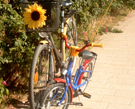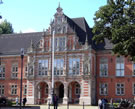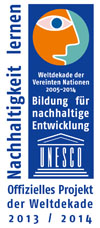Klimaportal der Lokalen Agenda 21 im Raum Harburg
Participation skills
Essentially, education for sustainable development (ESD) aims to enable the individual (learner) to actively and responsibly shape our common future - which centres on the ability to see the difference between a sustainable and an unsustainable development. This in turn prerequisites particular, sustainability-oriented knowledge and skills acquired via respective learning opportunities.
In Germany, a set of twelve "Participation Skills" (Gestaltungskompetenz) - originally made out by Prof. Gerhard de Haan and Dorothee Harenberg in 1999 (Institut Futur Freie Universitaet Berlin) - serve as a basis for ESD curriculum development.
Accordingly, ESD projects should clearly support the students' aptness to ....
- build knowledge in an open-minded fashion and integrate new perspectives
- analyse and assess development anticipatorily and circumspectly
- gain inter-disciplinary insights and act accordingly
- discern and judge risks, danger and uncertainties
- plan and act together with others
- consider conflicting aims in the reflection of strategic actions
- participate in collective decision-making processes
- motivate themselves and others to get involved
- reflect their own and other people's guiding principles
- base decision-making and actions on notions of fairness & equality
- plan and act independently
- develop empathy for and show solidarity with the disadvantaged
German sources:
http://www.transfer-21.de/
www.uport-hh.de
cb






